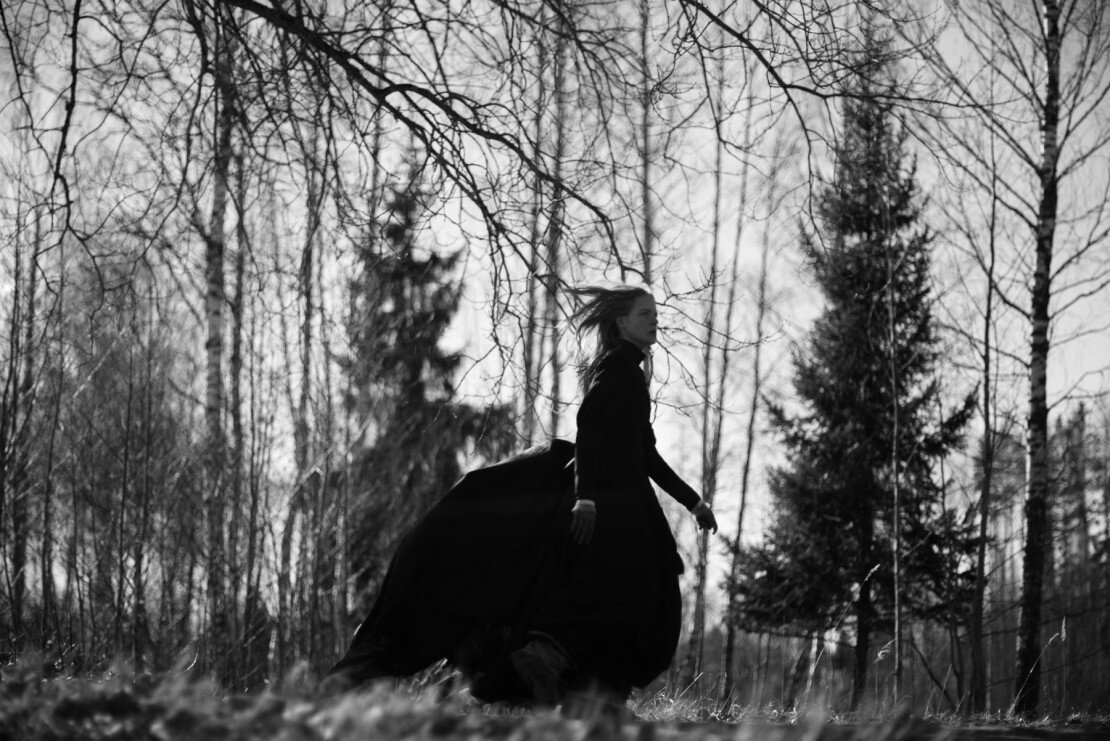Summary:
A poor village in Estonia tries to survive the winter by using magic, and a young girl among the villagers attempts to woo a young man.
My Thoughts:
“November” is a beautiful, poetic, darkly comedic, fantastical, tragic love story that will absolutely dazzle arthouse audiences (and probably no one else). The film was made in Estonia, shot in stark black and white, and the script features encounters with the dead and the devil, bargains with witches, bullets made of sacramental bread, magic spells, hidden treasure, a bewitched Baroness, a literal personification of pestilence, an omniscient snowman, and tools that are bewitched into creatures that speak and work. The film has many scenes where there’s very little dialogue, and the viewer is forced to often forced to piece together what it is that is happening, or, if what is happening is completely real or metaphorical. “November” is a fantasy masterpiece on par with many of the films that Guillermo Del Toro (“Shape of Water”) and Terry Gilliam (“Brazil”) have put out.
“Here two lovers sat in silence. And it was beautiful.”
Liina (Rea Lest), a young girl who lives in a strange, magical, small village in Estonia, is in love with Hans (Jorgen Liik), a young man who lives in the same town. For a while things seem good, but then a young baroness (Jette Loona Hermanis) visits the cathedral and Hans immediately falls in love with her, and seeks to win her love. Unbeknownst to her, Liina’s father has plans to marry her off to someone else. Meanwhile, the various villagers deal with all sorts of problems using magic obtained from a Witch (Klara Eighorn) or deals with the Devil (Jaan Tooming).
The thing I loved the most about this film was the worldbuilding and the way that the main story sort of just fell into the background. This story is more about encompassing the overall feeling of love rejected as Liina goes a time of heartbreak, and it does this by giving us a fantastical world filled with grief-stricken characters, filthy abodes, and a morose way of living. This world is incredibly melancholy- even the title- “November”- bodes of the dying time of the year, when all the plants have lost their leaves, and the worst part of the year- winter- is yet to come. The world itself is drab, muddy, desolate- even the home of the Baron and Baroness is unable to escape the bony fingers of poverty.
While the dark world is something that would feel at home in the films of Tim Burton (“Sweeney Todd: The Demon Barber of Fleet Street”), James Whale (“The Bride of Frankenstein”), or Robert Wiene (“The Cabinet of Dr. Caligari”), the magic we see onscreen feels far more mythical; it’s as if were watching how magic works as defined by Hans Christian Anderson or the Brothers Grimm. It’s strange, bizarre, and sometimes undeniably funny. We don’t have to completely understand why the dead come back to transform into human-sized chickens only to go hang out in a sauna; we just have to accept it and understand how it makes Liina feel about the world around her.
The cinematography in this film is absolutely gorgeous. The whole thing is in black and white, and the way the camera is often stationary, watching from a distance, makes it feel as if we’re outsiders looking in on someone else’s dream. There are other shots, however, that feel eerily reminiscent of Tarkovsky’s most haunting sequences in “Ivan’s Childhood” where the protagonist walks through desolate forests and battlegrounds. The whole thing is a magical experience that simply must be seen. I feel like even though I’ve described what is in this film and how the tone feels, I don’t come close to doing it justice.
Verdict:
This is one of the better fairy tales I’ve seen put to screen; it’s beautiful, heartbreaking, weird, and funny. I’ve only watched this once so far, but I expect “November” will long be on my list of films I recommend when someone asks for a good fantasy flick.
Review Written By:






